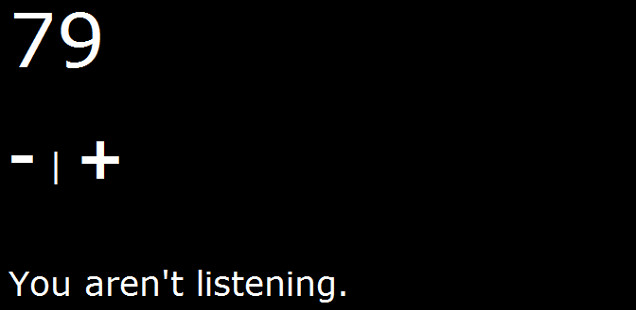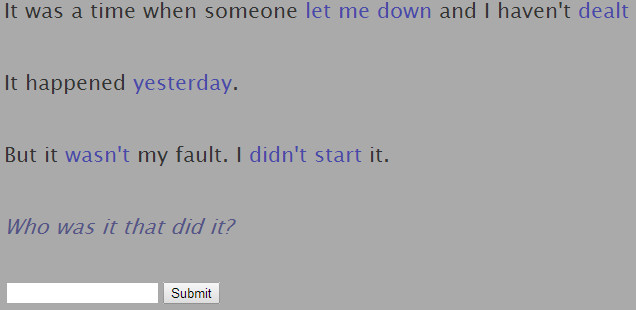
Set $Games to Destroy: Vol. 1
Soha Kareem shares four games made in Twine.
Never Have I Ever
This game reminds me of summer nights at bars with large patios, when everyone has an innocent round of drinks and we gush in elongated vowels about how it’s finally patio season in between taking high-contrast selfies with each other. Then, something triggers a turn of events. It may be seeing an ex-partner with a new beau or someone asking how your mother is doing with her recent diagnosis.
The night falls apart faster than you can process and you can’t remember which round of drinks the table is on. Your vision blurs behind a well of tears that leave black streaks down your cheeks mixing with snot, and other tables start to notice. It’s when you say things out loud that you weren’t able to before the last few rounds. It’s a type of vulnerability you can easily escape from – hail a cab, hide in the bathroom stall, or get some water – but you force yourself to sit through it and feel every second of the pain. It’s that kind of night.
Nina Raze and Molly Carroll capture that jarring switch by asking questions that peer a little too closely with after effects that linger a little too long, leaving me to wake up the next morning and ask myself, “Where the fuck did that come from?”
Mangia
Autobiographical content pulses in games, sometimes beating harder and louder than fictional narratives. Nina Freeman’s story is about her struggles with chronic medical conditions, eating disorders, and anxiety. She weaves matter-of-fact storytelling with scribbled drawings that confront the player after certain decisions. The anguish she experiences is so physical, yet what affected me the most was the relationships built within and from that pain. Backhanded compliments from her size zero mother and memories of friends poking at her belly are contrasted with the care and support of Nina’s partner, providing a sad, odd comfort in a story with so much misery. Even the title Mangia derives from an important relationship to Nina, expressed beautifully in the game’s epilogue.
I recently played The Cat Lady by Harvester Games, in which the protagonist, on the verge of suicide, has to find enemies named Parasites and kill them. The drawings felt a lot like these parasites, sucking health and embedding disease into the game’s structure. They are representations of harmful thoughts and repressed memories which stem from the depths of mental illness. They lie to you, pretend to be your friend, give you comfort, and then suck the life out of you. Looking back at Mangia, I could see the parasitic relationships Nina has in her life that feed the monsters of illness and starve her in the process.
Content warnings: anxiety, eating disorders
Everything you swallow will one day come up like a stone
Porpentine made this game available for 24 hours, and then deleted it. She writes, “This game will not be around forever because the people you fail will not be around forever.”
I was fortunate enough to download the game within its lifespan, and took my time through it one afternoon. I left it open on my browser, stepped away from it when I needed air, and came back when I needed to drown again. The content warns of rape, suicide, and abuse. I know these topics intimately, and knew whatever I encounter might hurt me.
I was right. This game really fucking hurt, butin the way that the words formed a grip around my heart and ripped it out. I clicked literally over a thousand times through mostly blank pages, counting towards an ending, and held my breath when I landed on passages like this one:
Acceptable delusions for trapped people:
-tested by God
-emitting pheromone that marks oneself for cruelty
-cursed
-no one would treat a human being this way therefore i am not human
-i deserved to be treated this way
I considered posting a link to make the game available again, but I couldn’t bring myself to do it because it would feel like betrayal. There was discussion about preserving an artifact like this, and this quote by Porpentine solidified my decision, “it is about what remains when someone doesn’t have enough strength to hold on anymore. about what other people do.”
I would privately cherish this piece, but continue to keep the subject of suicide and abuse alive because so many have died and keep dying from it.
Player 2
Step into Lydia Neon’s time machine, where you are transported to a memory when you were hurt by someone. You can cycle through options to further personalize this particular incident: it could be that someone lied to you, insulted you, or did something worse. You can answer when it happened, and even type in the person’s name. Before stepping in, Lydia reassures you that your information will not be saved, and even encourages you to input a self-care kit and the name of someone who makes you feel safe. By the game’s completion, you’re reminded to call that person.
This game was created for the Your Enemies Don’t Have to Die for You to Win game jam that aimed to showcase creative conflict resolutions. It helped me confront a demon who has been following me for several years, and actually acknowledge them as Player 2. It became a space filled with horrible memories which were within my control and navigated by my limits and boundaries. It showed me how I can share and talk about traumatic incidents without having to hurt anyone in the process, even the person who inflicted the trauma.
Lydia reminds us to breathe, to gather our thoughts, and that it’s going to be okay. This is a huge contrast to the work I usually play or design, which confronts trauma by ripping off the proverbial bandage in nightmare-mode difficulty. It’s truly a beautiful experience with the game’s meditative colors, as if someone out there really wants me to win.
Content warning: discussion of abuse
Soha Kareem is a games critic, experimental game designer, and MA Candidate from Toronto. Check out her portfolio, and see what she’s angry about on Twitter when her thesis is not driving her into madness.


